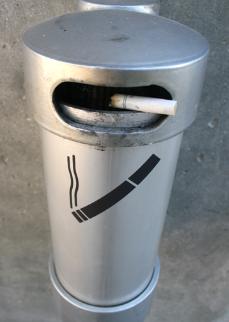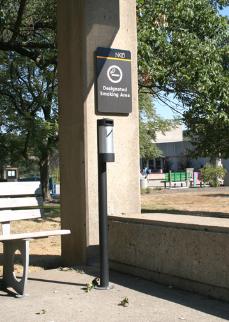

Signs of Northern Kentucky University’s smoking policy have been showing up all over campus – literally.
No-smoking signs are posted through campus as well as some declaring locations of designated smoking areas.
The Board of Regents passed the current smoking policy, dubbed the The NKU 2006 Clean Air Act. The act limits smoking to a designated number of areas around campus and gives officers the power to cite rule breaking.
Kim Luse, executive assistant to the president and Smoking Policy Committee chair, said the new policy is working well and that students are obeying the rules.
“I’ve been very impressed with how people have complied with it,” Luse said. “I think it’s really been one of our better efforts. We came together as a community, we looked at this from both sides of the fence and really tried to find something workable for everybody.”
Six locations on campus are designated as smoking areas. The six locations are: the plaza level between Landrum Academic Center and Steely Library, between the Applied Science ‘ Technology building and the new parking garage construction, next to the amphitheater at the tables outside the University Center, in front of Nunn Hall, between Albright Health Center and Regents hall by the baseball field, and on the eastern side of Dorothy Westerman Herrmann Natural Science Center (the lower side facing Landrum).
Luse said students may not be aware of the locations due to a lack of signage on campus. She said that most of the signs are posted, but a couple of the signs have been moved.
“There are two signs that have to be re-hung because there is so much construction going on that things seem to be shifting,” Luse said. Additional signs are also being ordered to cut down on confusion about where people can smoke.
Sandi Webster, an NKU staff member, said she didn’t mind going to the designated areas to smoke, though she’d like the areas to stay put instead of moving them around. “Signs here today, signs there tomorrow,” Webster said, referring to the designated smoking areas.
Ian Schulte, an undeclared freshman, is a non-smoker who said he thinks the policy is a good idea. He said he thought asthmatics wouldn’t want to be around smoke.
Kathy Pike, a junior Sociology major, said she didn’t mind having to smoke in the designated areas, but the University Center smoking area was the only one she knew of.
“As with every dramatic change, students are still adapting to this new initiative,” said Alyse Bender, SGA president. “While there is limited space to smoke, there are still adequate smoking areas available to the students, faculty and staff of NKU.”
In order to alleviate some confusion, Facilities Management has posted both the written policy and a map of designated smoking areas on its Web site (http://access.nku.edu/FacilitiesManagement/policies_and_procedures.htm). Luse said she believes that will help everyone on campus with finding the smoking and non-smoking areas.
Nevertheless, the only thing keeping students, faculty and staff from smoking in the non-smoking areas is their own compliance. There is no consequence for anyone smoking in a non-smoking area.
“Right now we really don’t have an offense system built in,” Luse said. “It is difficult to walk through the campus and police everyone.”
Though no changes have been made to the policy as of yet, Luse said Student Affairs will look at the goals of the policy after a year to see if those they are being met and, if they aren’t, then look at what needs to be changed.
Luse also said NKU is not planning to be smoke-free, at least not yet.
“Things are trending that direction across the nation, but we don’t have a date, for that, set. That isn’t to say it won’t happen one day in the future, but we don’t have a time line for that to happen.”
Overall, Bender and Luse both said they think the policy is doing well, despite the slight confusion.
“I’ve really been very pleased with the outcome. It seems like there hasn’t been a lot of issues or bumps along the way. I think we’ve done good work here,” Luse said. “I think it’s a better campus because of the policy and I think we addressed an issue that was outstanding for a lot of people.”

